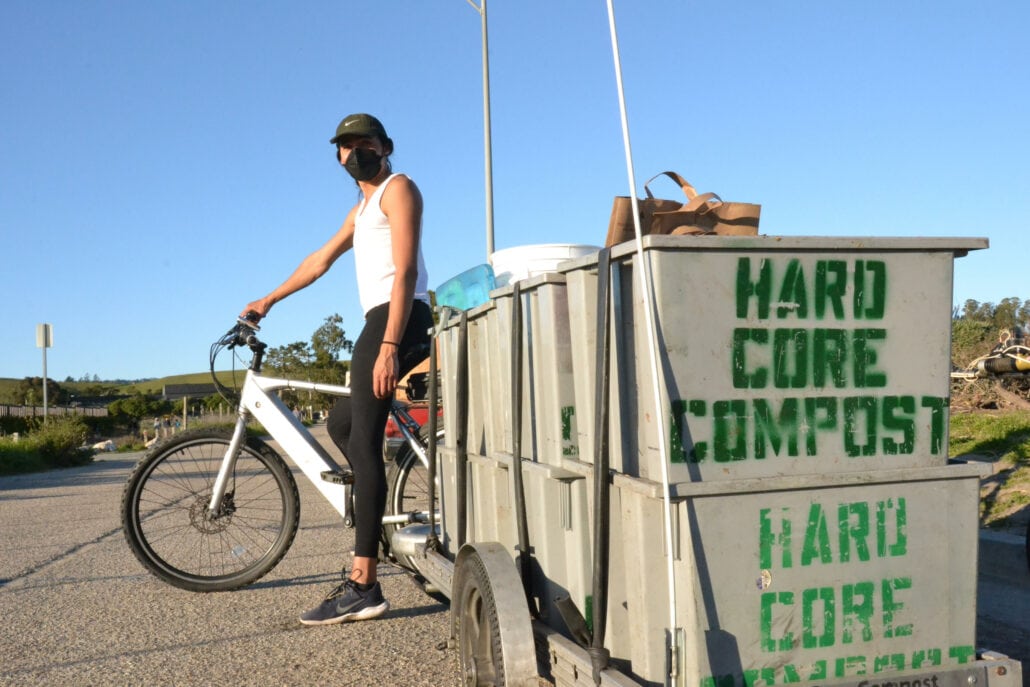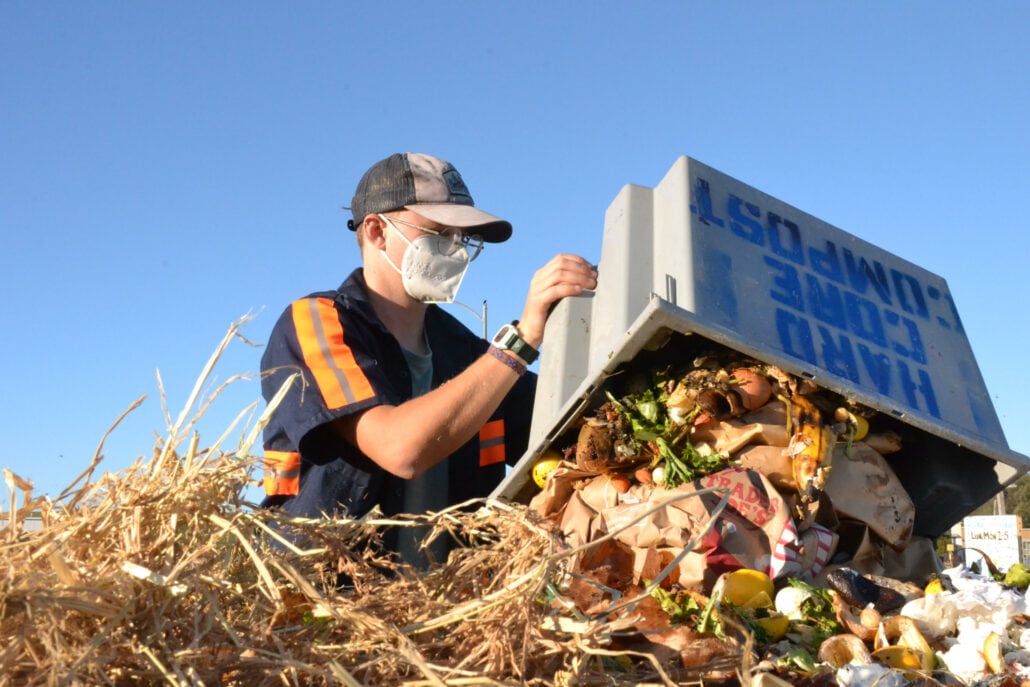By Alyce Thornhill, Talk Director
Special thanks to Kumi Maxson of Hardcore Compost Santa Cruz


. Alyce Thornhill 0:01
I was hoping that you could introduce yourself, what’s your name, your pronouns, and then a little bit about what you’re gonna be talking about today.
Kumi 0:10
Yeah, definitely. My name is Kumi, my pronouns are they/them, and I’m one of the worker owners at Hardcore Compost, which is what we’re going to be talking about today.
Alyce Thornhill 0:22
Great, thank you. Could you tell me a little bit about your organization, Hardcore Compost? And what is the mission of the company?
Kumi 0:29
Yeah, so Hardcore Compost is a worker-run compost collection service that operates in most neighborhoods in Santa Cruz. And the mission of our company is, one, to create a local and sustainable way for people to dispose of their food scraps and not take them to the landfill, and also to create work working environment where the workers can really have control over the business and have a say in their working conditions and also in the direction of the company.
Alyce Thornhill 1:06
Great. And just to sort of go on a little bit about the worker model of the company. So you mentioned that it’s a worker co-op. Can you explain a little bit about how that works? And what advantages does such a model pose?
Kumi 1:20
Yeah, definitely. So there’s lots of different different models of co-op business structures with lots of different nuances. But basically, how we do it is we are an LLC type business, which doesn’t necessarily mean that we have to be a co-op. But how we do it is all of the members, all of the workers are equal members within the LLC. So from a money standpoint, that means we all get a share of the profits and stuff like that. But what really makes us a co-op is the way that we have our governance structure. And we make decisions within the company, which is consensus based. So we have meetings every other week, where people bring agenda items, either, you know, normal operations, things that we need to address, or could be doing better, or new projects or ventures that people want to take within our organization. And then we all decide whether that we think that that’s something important to do as a company or not. And if people feel hesitant about things, you know, we discuss them until, and make modifications until it’s something that everyone feels that they can get behind. Or if it’s something that people don’t, you know, then it’s not something that we move forward with. And so I think that’s one big element of being a co-op. And the other is also just the fact that all the people doing all the work are also the people that own the business, there’s no boss who we are working for, there’s no boss who’s reaping the profits of our labor. It really is us doing all the work and also us doing all the other tasks that it takes to run a business on top of the compost collection labor.
Alyce Thornhill 3:10
I see. And that’s interesting, because I think if we compare it to maybe other waste management services, those have a very hierarchical structural sort of form of governance. And so it’s very interesting. I think that your organization specifically is very egalitarian. And it seems like that makes it more functional almost. And so I was wondering if you could talk about you mention[ing] that the responsibilities are sort of dispersed amongst all the people in the co-op. What is your day to day as a member of that look like?
Kumi 3:44
Yeah, so my responsibilities within the co-op are customer service. So, you know, my day to day will look like checking our emails and our phone calls and replying to our customers or other people that contact us with questions. We currently have 330 customers about so it’s quite a lot of work. Someone always has a question or a request from us. And then outside of that clerkship duties a normal day working with the compost would either look like riding a route, which is setting up a bike trailer, connected to the bike riding around whichever area of Santa Cruz we have the route in that day, collecting people’s food scraps that they leave out on the curb for us. Or some days I’ll be working at our site where we turn the compost into soil and the duties that we have there. You know, taking the material that we’ve collected within the week, it’s about 3000 pounds per week. And building a compost pile out of that. And then also some days we turn those piles so every few weeks the pile gets turned and then after it turns It turns four times, then it’s our finished product.
Alyce Thornhill 5:04
So it seems like there’s both the business side and then the actual on the ground going out there side. So you mentioned that you have over 330 customers involved, what would be the process of someone who would like to get involved with the organization and wanting to dispose of their waste through your organization?
Kumi 5:21
We have a website with a signup form. The website is www.compost.bike. And it’s pretty easy to sign up on our website. It’s $30 a month, but we also have a sliding scale option for folks who aren’t able to afford that.
Alyce Thornhill 5:43
And that, you know, the sliding scale sort of makes me think of my next question I wanted to ask about which was, this seems to be organization that is founded by working class people, sort of for working class people. And I think a lot of this has to do with the importance of sustainability. Specifically, as I think when we’ve had previously talked, we mentioned that a lot of the people involved were students or former students. And I feel like a lot of the struggle of Santa Cruz being a college town is sustainability on things like People’s Kitchen or Food Not Bombs. Although these students are able to volunteer and help, in short spurts, it’s hard to make these long term commitments. So I was wondering if you could speak a bit to that.
Kumi 6:26
Yeah, most of our members are former students of UCSC. And it really, our company gives an opportunity for people. I mean, you don’t have to have been a former student, some of our members are also people who are just locals. But, you know, you move to a town to go to school. And if you find yourself staying there, this is a way at least for us to really be integrated in the community in a more meaningful way. And to be providing a service to the community that’s really valuable to them, and also is sustainable in in the way that, you know, co-op run businesses do tend to last longer and be able to overcome challenges much rather, are much more than businesses that are just made up of employees that don’t really have an investment in the work that they’re doing. Something happens and they’d go rather find another job that either pays better or treats them better. But for us, since we’re the ones that dictate those conditions, you know, we’re always trying to make sure that the business is something sustainable, make sure that it is something that people are able to keep doing, and is also serving the needs of the community the best he can and serving the needs of its members. Because, as you know, Santa Cruz is a pretty expensive place to live. So we’re always trying to strive to meet that sort of like living wage benchmark and things like that.
This is a way at least for us to really be integrated in the community in a more meaningful way. And to be providing a service to the community that’s really valuable to them.”
Alyce Thornhill 8:03
Yeah. And what really strikes me as you mentioned, this investment that the workers have in their own organization, which I think speaks to the worker co-op model. But also it seems that this organization, Hardcore Compost also has an investment in the land. And I really, really was felt spoken to by the mission statement on your website, which said that a core belief of the company is that, “The resilience of our communities is inseparable from the health of the land we live on.” So what do you personally see, as sort of your responsibility to this land? And what responsibility do you think we have, as perhaps settlers or people moving to this area? To help preserve and nurture it?
Kumi 8:45
Yeah, definitely. I think that, you know, these topics of sustainability, that are often thrown around, you know, these buzzwords, but they really do need to take a holistic approach to it. So not only do we try to create jobs that are sustainable, and work environment that’s sustainable, but really thinking about what we’re doing with those jobs. And yeah, we I mean, we don’t we don’t work directly with the land in terms of like we’re not farming or doing like habitat restoration or things like that. But we do recognize that by removing the landfill impact, and also by doing that in a way that has a very low carbon footprint and is remaining local, and also returning that soil to our customers, we’re really creating a model of a more sustainable society where you know, things are not being wasted things are being used and being re generated into something new, which I think is a concept that we’re very removed from a lot of times in the way that we have to, you know, buy the things you need and then you use them and then the waste goes in the trash. To be taken off, never to be seen again to you. But really, in this way, like, with our customers, and with us, as you know, interacting with the compost in this way, we have this picture of this cycle that I think is something that, even just philosophically, is really important to have a connection to.
Interacting with the compost in this way, we have this picture of this cycle that I think is something that, even just philosophically, is really important to have a connection to.”
Alyce Thornhill 10:26
Yeah, for sure, I think that’s really fascinating notion that the work your organization is doing is helping to rekindle that connection between land and person and not just by well, first of all, by seeing the impact of their wastes like, you know, intellectualizing that this is going somewhere and not just going away to a pile on garbage island somewhere. But that like these things can be reused in the land can give back in the ways that we give to it.
Kumi 10:57
Yeah. And also, along those lines, we do recognize that the land got we both operate our collection routes on and do turn our piles and process our compost on is unceded territory of the indigenous peoples of this area. So as organization, you know, it’s the least we can do. But we do like give a land tax monthly to the Amah Mutsun tribal band. And it’s some an intention that we have for our business to develop more of a formal relationship with them. But yeah, that’s something that we’re definitely aware of and feel responsibility towards.
Alyce Thornhill 11:35
Yeah, for sure. There’s so much we can learn from indigenous peoples in terms of respecting land and giving back to it for sure. And then sort of to transition to the end of this interview, I wanted to ask a little bit, something we had talked about just before this, about the future of your organization, specifically with you mentioning that there is going to be new policy, or there was new power policy passed with waste removal for the city. So I was wondering if you wanted to talk a bit about that.
Kumi 12:03
Yeah. So that went into effect at the beginning of this year, a state bill that requires jurisdictions to provide an organic waste collection service. So you know, this is something that we’ve been doing for quite a few years now. But the city is going to now be offering their own curbside collection program. And our goal is to let the community know that we’re also here, we also are here as a local, small business that’s providing these green jobs for our employees, providing jobs that are really sustainable, not only for the economy and for our members, but sustainable for our planet. As well as providing those locally, and also providing a compost service that is staying local. I believe the city’s going to be taking their waste some of it to Santa Clara, and some of them to the wastewater treatment plant here in Santa Cruz. And they’re going to be processing it in a variety of ways. But neither of those are compost. So if people are really, you know, interested in receiving the soil back from their food scraps, and these things like that, that will still continue to operate alongside the city, and also continue to also provide like, community resource and community connectedness that I think is a benefit of our program. We’ve also recently received a grant from CalRecycle that we’re going to use to sort of make some updates to our site and have it be a more of a community space and have educational workshops and stuff like that. So yeah, we just really want people to know that there are multiple options within the city for what they want to do with their food scraps and how they want them to be processed. And, you know, if they have the means that there’s a great option to support a local sustainable business.
Our goal is to let the community know … we also are here as a local, small business that’s providing these green jobs for our employees, providing jobs that are really sustainable, not only for the economy and for our members, but sustainable for our planet.”
Alyce Thornhill 14:11
It’s definitely always good for people to know their options in terms of that. And we know that small businesses are very crucial to this, this part of Santa Cruz. Is there anything else you would like our listeners to know about your organization or the work you do?
Kumi 14:24
Yeah, if folks are interested, we have an Instagram page. It’s just @HardcoreCompost, all one word, no spaces. And we also have a website that I mentioned earlier, which is www.compost.bike, and just you know, even if it is, or even if people are composting with the city, just to have that awareness of you know, your food scraps are going somewhere that’s not just in the landfill and you know, the benefits that that has to you and to our community and to our planet as a whole.
Alyce Thornhill 15:02
Great, thank you so much for coming. I really appreciate your time and you taking the time to speak with me and definitely very much appreciate your work that you do for our community and our lands.
Kumi 15:12
Thank you so much for having me.

